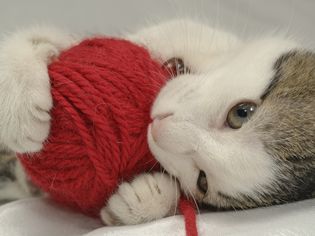
How to Stop Wool Sucking in Cats
Although not all cats have the urge to suck on soft fabrics, such as wool, it can become ...
If your cat died, and you can't stop crying, feeling lonely, or otherwise experiencing grief, you're not alone. Cats are integral parts of our families and companions like none other. They are a source of entertainment and emotional support, and they have individual personalities.
In addition, cats often live into their late teens or early twenties so they are in our lives for a very long time. Because of this, when they pass away it is natural to feel as though there is a void within you. Here's how to cope with the grief.
The loss of any loved one, regardless of whether they are a human or animal, is painful. Death and the emotions it brings are never easy to deal with. When the cat that has died was a constant in your daily life, it can be very hard to get through your day without them. However, learning to recognize and deal with the situation is an important part of managing the loss of your cat. As hard as it is, there are thankfully some things you can do to help guide yourself through the process of grieving. The process of grieving a pet cat is no different than that of a human family member or any other pet. You will go through the same stages of grief as you would for anyone else.
According to the Kübler-Ross model, there are five stages a person may go through to cope with grief.
These stages do not necessarily happen in a specific order but may occur in someone grieving the loss of their cat.
Denial is typically one of the first stages of grief that you will go through. This stage, like any of the other stages of grief, is different for everyone and you may even skip this stage altogether. You will eventually come to terms with losing your cat, but there's nothing wrong with acknowledging that what you are feeling is normal and okay.
Another stage of grief is anger. You may feel angry at your cat, yourself, a disease, or someone or something else, but remember that it’s okay to feel this way because feelings are always valid. How you react to your feelings is what is important. Yell into your pillow, cry, write down your emotions, work out at the gym, or go for a run and let your mind and body process this anger.
Remember it’s okay to be angry, but don’t stay angry longer than necessary or take it out on those around you. It may be easy to lash out or blame whoever is nearby—including your veterinarian—but try to understand that your veterinary staff are there to help and are often also saddened by the loss. Nothing can change what has happened, so you need to remind yourself that you are simply grieving, and being angry is just a part of that. Staying angry for too long will not help anything, but at the same time, there is no time limit for grieving.
You may find yourself trying to figure out what you could have done differently to prevent the death of your cat. Some people will express “if only” and “what if” sentiments or try to strike a deal with a higher power through prayer to bring their cat back.
Almost everyone experiences the stage of grief known as depression. Crying, sleeping a lot, not wanting to do anything, feeling lonely, not wanting to eat, and other symptoms of sadness are very normal for you to exhibit after your cat has passed away. Honor these emotions but remind yourself that they will slowly be easier to manage as time goes on, and you won’t feel this depressed forever.
It may take some time, but acceptance is a must for anyone who has lost a loved one. If your cat has died, you will inevitably need to adjust to life without them. How you do this may vary from someone else but you must find a way to accept it. You will always miss your cat, but once you accept that they are gone it will slowly get easier to continue with your life without your cat.
Different things will help different people cope with the loss of their cat. Some people need to be alone, while others will feel the need to get a new cat as soon as possible. Try some of the following tips if you aren’t sure how to process your grief:

Although not all cats have the urge to suck on soft fabrics, such as wool, it can become ...
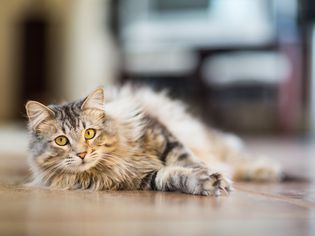
Scruffing is a general term for a variety of holds on the skin of a cat’s neck. Cats ar...
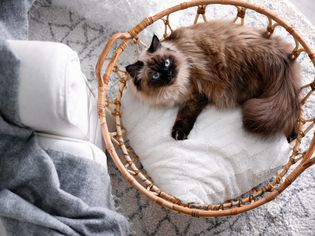
Cat language—including cat talk and non-verbal messages—is sometimes puzzling. Cats h...
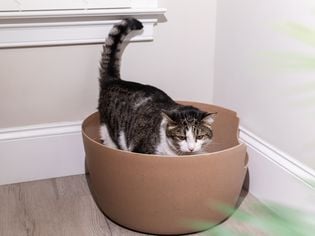
Covering poop is a normal cat behavior, right? Not necessarily. Wild cats that bury thei...
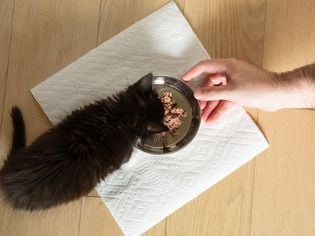
You may have noticed that before and/or after your kitten or cat eats or drinks, it will ...

Cats' aluminum-foil aversion tempts some pet owners to cover their countertops in the shi...

Most cat experts recommend premium brands of cat food that avoid ingredients like meat by...
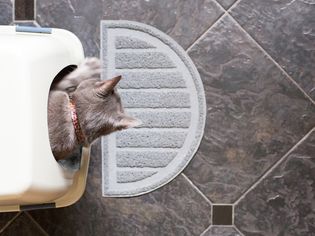
Senior cat litter box problems happen all too often and aren't necessarily a reflection o...
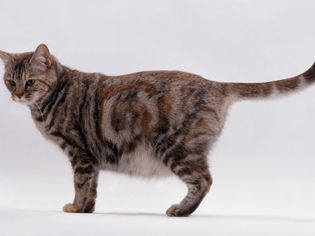
One controversial issue in shelter settings is whether or not to spay a rescued pregnant ...
Comments on "How to Deal With the Loss of Your Cat" :